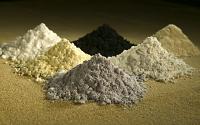India

Quicktabs: Keywords

The author argues that the recent outrage over U.S. freedom of navigation operations in India's territorial waters are not a concern as both India and the U.S. are in alignment about the need to enforce UNCLOS provisions, it just may not be politic for both sides to admit as much.
[ More ]
In two recent international joint statements, India has taken slightly different positions on the biggest point of international conflict that is about to come to a head in the coming days, leading to some confusion.
[ More ]
An interview with the director of the Indian National Centre for Ocean Information Services on India's plans for taking advantage of mineral deposits in the Indian ocean.
[ More ]
China has come up with a sweetheart deal to break through India's resistance to its attempt to access the Indian Ocean. It is offering India an opportunity to participate in joint seabed mining in the ocean, which has strong potential of yielding expensive minerals.
[ More ]
In a pointed rebuke of China, India strongly advocates adherence to the Law of the Sea as the best way to resolve disputes in the South China Sea.
[ More ]
India, with approval from the International Seabed Authority (ISA), will launch exploration of mineral deposits such as polymetallic sulphides off the coast of Mauritius.
[ More ]
The ocean's potential to meet the country's energy requirements is vast and must be tapped in a sustainable manner, said India's Harsh Vardhan, Union minister for science, technology and earth sciences. However, India is in a race
[ More ]
Ahead of Xi Jinping’s scheduled three-day visit to India, Indian President Pranab Mukherjee traveled to Vietnam for a state visit. At the conclusion of his trip to Vietnam, Mukherjee and his counterpart, Truong Tan Sang, issued a joint communique in which they jointly called for countries to stand for freedom of navigation in the disputed South China Sea.
[ More ]
India has joined the race to explore and develop deep-sea mining for rare earth elements — further complicating the geopolitics surrounding untapped sources of valuable minerals beneath the oceans.
[ More ]India has joined the race to explore and develop deep-sea mining for rare earth elements — further complicating the geopolitics surrounding untapped sources of valuable minerals beneath the oceans. The country is building a rare-earth mineral processing plant in the east coast state of Orissa and it is spending around US$135 million to buy a new exploration ship and to retool another for sophisticated deep-water exploration off its coast. The Central Indian Basin, for example, is rich in nickel, copper, cobalt and potentially rare-earth minerals, which are highly lucrative and used widely in manufacturing electronics such as mobile phone batteries. They are found in potato-shaped nodules on the deep-sea floor. "These nodules offer a good solution to meeting the nation's demand for metals," C. R. Deepak, head of the deep-sea mining division at the National Institute of Ocean Technology (NIOT), Chennai, told SciDev.Net.
